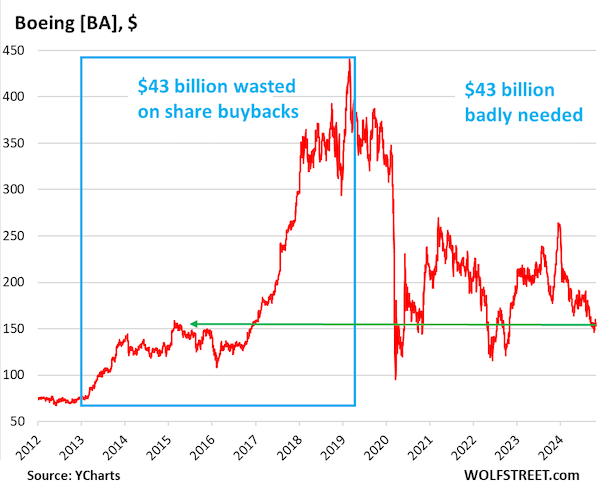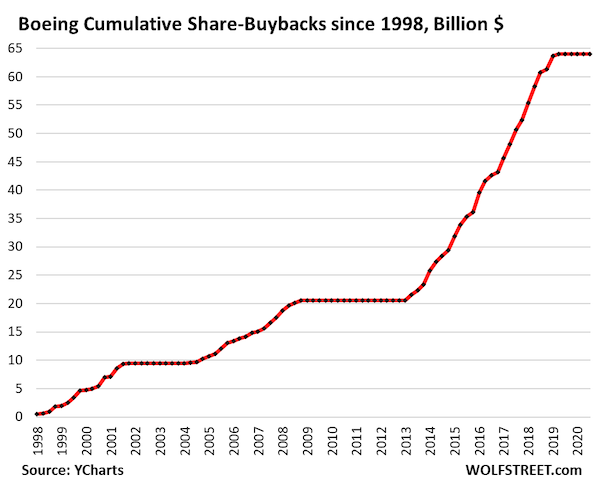Lambert here: Hard to see why “engineering” in “financial engineering” doesn’t have air quotes around it.
By Wolf Richter, editor of Wolf Street. Originally published at Wolf Street.
Boeing, which has booked net losses every year from 2019 on, totaling nearly $32 billion, and which has borrowed huge amounts of money over those years, bringing its short and long-term debt to $58 billion while gutting its stockholder equity, now a negative $23.6 billion, has been in dire need of lots of cash to burn, after it wasted and incinerated $64 billion in cash on share buybacks to pump up its shares.
The company’s infamous pivot from aircraft engineering to financial engineering to please Wall Street has turned into a devastating mess, including for shareholders. Wall Street loved it at the time, and the shares soared by 500% between 2013 and the peak in early 2019. But since then, shares plunged and have given up most of the gain, and are back where they’d first been 11 years ago.
So today, after days of rumors about a share offering, Boeing announced a huge stock offering that will undo some of the devastation that the share buybacks wreaked upon its balance sheet, and it will dilute the bejesus out of current shareholders.
It will sell 90 million common shares (about $14 billion at the current share price) and $5 billion of mandatory convertible preferred stock that will qualify as equity for credit rating purposes. So that’s about $19 billion. It also granted underwriters the option for an additional 13.5 million shares ($2.1 billion at the current price). And according to a term sheet seen by Reuters, it can increase the mandatory convertibles by $750 million.
All combined, it would increase the total equity raised to $22 billion.
The mandatory convertible preferred stock is being marketed to investors with a dividend of 6.0% to 6.5%, and a premium of 17.5% to 22.5% to the stock’s closing price on Friday of $155.01, for when they convert into common shares at or before the maturity date of Oct. 15, 2027, according to Reuters.
This offering brings in sorely needed equity capital that the company had so recklessly incinerated with share buybacks before 2019. And it would largely fill in the huge hole that is its negative equity of $23.6 billion.
If Boeing actually raises the entire $22 billion, it would undo about half of the devastation of its balance sheet wreaked by the $43-billion wave of share buybacks in 2013-2019. That wave of share buybacks caused shares to spike by 500% into early 2019, pushing them from $75 to $450.
Now they’re at around $153 at the moment, where they’d first been in February 2015, down about 66% from the peak, just a hair from qualifying for a pedestal in our pantheon of Imploded Stocks (data via YCharts).

The dilution of existing shareholders from the share offering is going to be significant: There are 618 million shares outstanding, and adding the 90 million shares being offered today would dilute existing holders by about 15%. That’s before the conversion of the mandatory convertibles and the option of 13.5 million additional shares granted to underwriters. So if and when Boeing is actually profitable again, the earnings per share will be diluted by at least 15%.
Boeing stopped the share buybacks in 2019 as its difficulties mounted after two of its misbegotten 737 Max 8 aircraft crashed. Instead of wasting and incinerating $43 billion on share buybacks in 2013 through 2019 and $20 billion in the decade before the Financial Crisis, for a total of $64 billion, the company should have developed a brand-new plane to replace the 737. It should have fired the financial engineers and hired some aircraft engineers (data via YCharts).

Boeing’s corporate credit rating is currently one notch above junk at Moody’s (Baa3), S&P (BBB-), and Fitch (BBB-). There were fears that the cash-flow problems, production and quality issues, the huge amount of debt, and the ongoing strike by 33,000 workers that shut down much of the production in September, would trigger a downgrade to junk (our cheat sheet for corporate credit ratings by ratings agency).
A junk credit rating would make it even more difficult and costly for Boeing to raise the funds it needs to cover its massive cash bleed and to pay off the $12 billion in debt that is coming due in 2025 and 2026.
With the equity raise as outlined today, the company will have some limited financial breathing room, and will likely avert a near-term down grade to junk, so one day at a time. But it won’t resolve the production and quality issues around its aircraft, its labor woes, and the decades of damage that financial engineers from the top down had done to the company.














